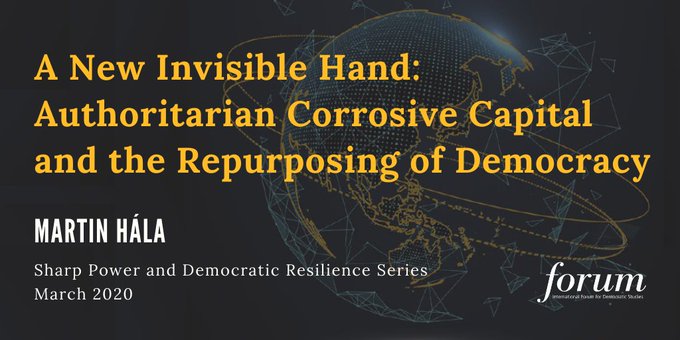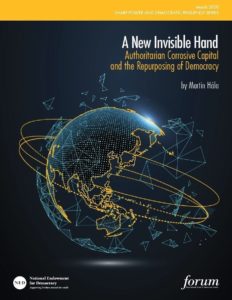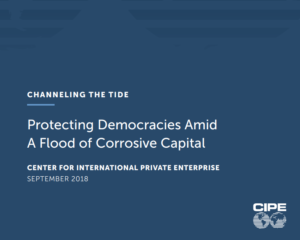 Illiberal regimes like those in China and Russia use capital as a foreign policy tool and often as a form of strategic corruption to bolster authoritarianism as a globally competitive governance system, according to a new analysis.
Illiberal regimes like those in China and Russia use capital as a foreign policy tool and often as a form of strategic corruption to bolster authoritarianism as a globally competitive governance system, according to a new analysis.
“A New Invisible Hand: Authoritarian Corrosive Capital and the Repurposing of Democracy,” by Martin Hala, explores the threat of corrosive capital—capital flows from authoritarian regimes that undermine democratic processes and institutions in recipient states—and proposes an interconnected, interdisciplinary response from civil society.
Key findings:
 Corrosive capital – capital flows from authoritarian regimes that undermine democratic processes and institutions in the receiving countries – is a new challenge that has no clear precedent in previous competitions between liberal democracy and authoritarianism.
Corrosive capital – capital flows from authoritarian regimes that undermine democratic processes and institutions in the receiving countries – is a new challenge that has no clear precedent in previous competitions between liberal democracy and authoritarianism.- Corrosive capital and strategic corruption differ from other forms of corruption in that they are backed, and sometimes orchestrated, by a state power for political rather than economic goals—or to advance a comprehensive authoritarian agenda with inseparable political and economic objectives.
- The Chinese Communist Party, and the Kremlin in a less formalized manner, have strengthened mechanisms of control over private and state-owned enterprises in an effort to use businesses to achieve domestic and foreign policy goals.
- Elite cooptation through corrosive capital ultimately repurposes the institutions overseen by captured leaders to serve the outside authoritarian power’s goals. With relatively modest “investments”—often a combination of direct benefits for key individuals and questionable loans that use local resources as collateral—an authoritarian power can penetrate and corrode the institutional framework of democratic rule from the top down.
- Civil society has an important role to play in an effective defense against corrosive capital, particularly in settings where the other pillar of resilience, democratic governance, suffers from large-scale elite capture and repurposed institutions are at risk of failing to safeguard the integrity of the political system and the national interest.
- Local collaboration should be supplemented with cross-border cooperation among knowledge hubs and individual researchers working on the same issue areas. Corrosive capital is, by definition, a transnational phenomenon and it can only be understood through active collaboration among partners in various countries.
 An effective defense against corrosive capital in democratic societies depends on many factors, but it ultimately derives from the resilience of the political system and civil society, the report concludes:
An effective defense against corrosive capital in democratic societies depends on many factors, but it ultimately derives from the resilience of the political system and civil society, the report concludes:
All democracies can be exposed to corrosive capital, but the more established systems tend to fare better than comparatively new democracies. One only needs to look at the different responses to Chinese activities in Australia on the one hand and Central and Eastern Europe on the other. The contrast is especially remarkable given the fact that Australia has a much deeper economic relationship with China, as well as a much larger Chinese diaspora community (often a target of CCP coercion). Despite the higher stakes, Australia has managed to formulate an energetic policy response, while, in the countries of Central and Eastern Europe, the pushback has mostly been left to civil society if it exists at all. RTWT







